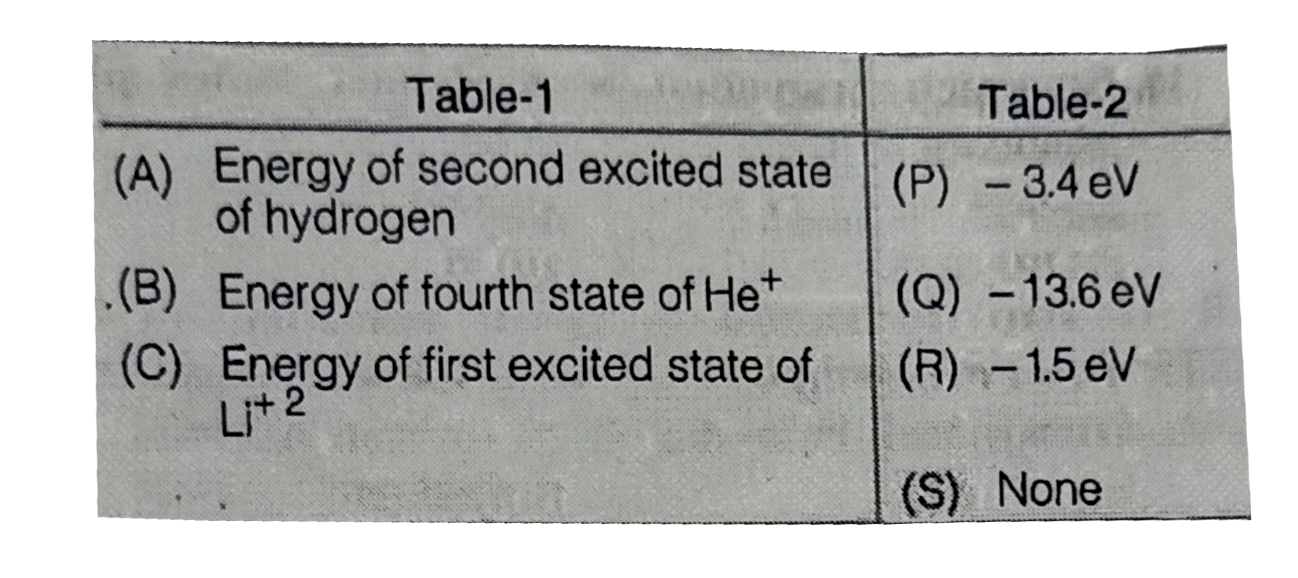If the ionization energy for the hydrogen atom is 13.6 eV , the energy required to excite it from the ground state to the next higher state is nearly
3.4 eV
10.2 eV
17.2 eV
13.6 eV
The correct Answer is:A
To find the energy required to excite a hydrogen atom from the ground state to the next higher state, we can follow these steps:
1. Identify the Ionization Energy:
The ionization energy for the hydrogen atom is given as 13.6 eV. This is the energy required to remove the electron from the ground state (n=1) to infinity (n=∞).
2. Determine the Energy of the Ground State (E1):
The energy of the ground state (E1) can be expressed as:
E1=−13.6eV
This is because the ionization energy is the difference between the energy at infinity (0 eV) and the energy at the ground state.
3. Use the Energy Formula for Hydrogen Atom:
The energy of an electron in a hydrogen atom at any energy level n is given by the formula:
En=−13.6eV⋅Z2n2
For hydrogen, Z=1.
4. Calculate the Energy of the Second State (E2):
For the second energy level (n=2):
E2=−13.6eV⋅1222=−13.6eV4=−3.4eV
5. Find the Energy Difference (ΔE):
The energy required to excite the electron from the ground state (E1) to the second state (E2) is given by:
ΔE=E2−E1
Substituting the values:
ΔE=(−3.4eV)−(−13.6eV)=−3.4eV+13.6eV=10.2eV
6. Conclusion:
The energy required to excite the hydrogen atom from the ground state to the next higher state is approximately 10.2 eV.
The ionization energy for the hydrogen atom is given as 13.6 eV. This is the energy required to remove the electron from the ground state (n=1) to infinity (n=∞).
The energy of the ground state (E1) can be expressed as:
E1=−13.6eV
This is because the ionization energy is the difference between the energy at infinity (0 eV) and the energy at the ground state.
The energy of an electron in a hydrogen atom at any energy level n is given by the formula:
En=−13.6eV⋅Z2n2
For hydrogen, Z=1.
For the second energy level (n=2):
E2=−13.6eV⋅1222=−13.6eV4=−3.4eV
The energy required to excite the electron from the ground state (E1) to the second state (E2) is given by:
ΔE=E2−E1
Substituting the values:
ΔE=(−3.4eV)−(−13.6eV)=−3.4eV+13.6eV=10.2eV
The energy required to excite the hydrogen atom from the ground state to the next higher state is approximately 10.2 eV.
Topper's Solved these Questions
- STRUCTURE OF ATOM Book:NCERT FINGERTPS ENGLISHChapter:STRUCTURE OF ATOM Exercise:HIGHER ORDER THINKING SKILLS
Explore 11 Videos
- STRUCTURE OF ATOM Book:NCERT FINGERTPS ENGLISHChapter:STRUCTURE OF ATOM Exercise:NCERT EXEMPLAR PROBLEMS
Explore 16 Videos
- STATES OF MATTER Book:NCERT FINGERTPS ENGLISHChapter:STATES OF MATTER Exercise:Assertion And Reason
Explore 15 Videos
- THE P-BLOCK ELEMENTSBook:NCERT FINGERTPS ENGLISHChapter:THE P-BLOCK ELEMENTSExercise:Assertion And Reason
Explore 15 Videos
Similar Questions
Knowledge Check
the energy required to excite an electron in hydrogen atom to its first excited state is
A8.5eVB10.2eVC12.7eVD13.6eV
The ionisation potential of hydrogen atom is 13.6eV. The energy required to remove an electron in the n=2 state of the hydrogen atom is
View SolutionIf the binding energy of the electron in a hydrogen atom is 13.6eV, the energy required to remove the electron from the first excited state of Li++ is
View SolutionThe ionisation potential of hydrogen atom is 13.6eV The energy required to remve as electron in the n=2 state of the hydrogen atom is
View SolutionThe ionisation potential of hydrogen atom is 13.6 volt. The energy required to remove an electron in the n=2 state of the hydrogen atom is
View SolutionThe ionization energy of hydrogen atom is 13.6 eV. Calculate Rydberg's constant for hydrogen.
View SolutionThe ground state energy of hydrogen atom is −13.6eV. The energy of second excited state of He+ ion in eV is
View SolutionWhen a hydrogen atom is excited from ground state to first excited state, then
View Solution
